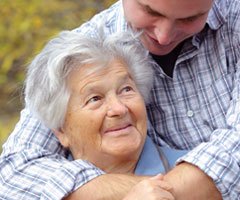Apheresis Donation
Helping the community: A special kind of blood donation
Apheresis is a special kind of blood donation when specific components — platelets, plasma, or white blood cells — can be collected.
During an apheresis donation, we collect whole blood from the donor and put it into a machine called a "cell separator." We spin the blood in the machine to separate the components and collect a measured amount of the desired component in a special bag. We then return the red cells and other components to the donor.
An apheresis platelet donation can provide as many platelets as six whole blood donations. Also, a platelet transfusion from a single donor greatly reduces the chances of an immune system reaction to the transfusion. Bone marrow transplant, cancer, and leukemia patients whose immune systems are already compromised benefit, particularly from single donor platelet transfusions.
Frequently asked questions
- What are platelets, and why are they so important?
- Who needs platelets?
- How long does apheresis take?
- Who can give platelets?
- Is apheresis safe for me?
- Are there any side effects during the procedure?
What are platelets, and why are they so important?
Blood is a mixture of red cells, white cells, plasma, and platelets. Platelets are cells that help control bleeding.
Who needs platelets?
Many lifesaving medical treatments require platelet transfusions. Cancer patients, those receiving organ or marrow transplants, victims of traumatic injuries, and patients undergoing open-heart surgery require platelet transfusion to survive.
How long does apheresis take?
Depending on your weight and height, the actual apheresis donation process will take approximately 70 minutes to two hours. This includes donor registration, health interview, and time for refreshments. You may watch television, watch DVDs, listen to music, or just sit and relax while helping save lives.
Who can give platelets?
Platelet apheresis donors need to meet the requirements for donating blood. You must weigh at least 115 pounds, be at least 16 years old with a signed parental consent form and be in good health.
If you meet the requirements to donate blood, your platelet count will be determined during the mini-physical before donation. To be eligible to donate platelets, you cannot have ingested aspirin 36 hours before donation.
Is apheresis safe for me?
Yes, apheresis donations are very safe. Each donation is closely supervised by trained staff who observe the donors throughout the process. Only a small percentage of your platelets are collected, so there are no risks of bleeding. Your body will replace the donated platelets within 48 hours. The donation equipment—needle, tubing, and collection bags—is sterile and discarded after each donation, making it virtually impossible to contract a disease from the process.
Are there any side effects during the procedure?
The vast majority of apheresis donors experience no discomfort during the collection process. Some feel a slight tingling sensation around the lips and nose during donation. This reaction is caused by the anticoagulant used in the procedure. This can be easily controlled if the donor tells the staff about his or her discomfort. Donors may feel a slight chill during the donation. We'll be happy to provide a blanket to keep you warm.
Questions about donating - call Lee Health Blood Center at 239-343-2333
-
Blood Center - Bonita Health Center
-
Blood Center - Lee Memorial Hospital
-
Blood Center - Cape Coral Hospital
-
Blood Center - Summerlin Crossing
-
Lab Services - Cape Coral Hospital
-
Lab Services - Coconut Point
-
Lab Services - Downtown Cape Coral
-
Lab Services - Golisano Children's Health Center
-
Lab Services - HealthPark Commons
-
Lab Services - Pine Island Rd
-
Lab Services - Lee Memorial Hospital
-
Lab Services - Plantation Rd
-
Lab Services - Surfside
-
Lab Services - The Sanctuary
Related to Apheresis Donation
-
Blood Donations
Giving blood is safe, easy, and it saves lives. Plus your donation stays right here in Southwest Florida. Blood drives and donations for residents in Fort Myers, Naples, Cape Coral, Bonita Springs, and Estero.


